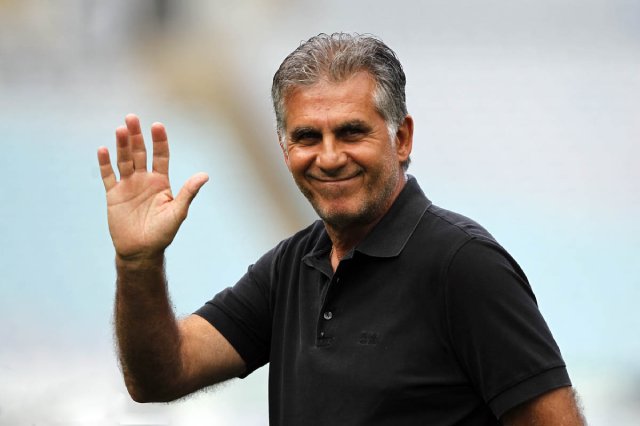The Persian version of this article has printed in “Goal” daily, Dated: Wednesday, June 14, 2017.
There Are Plenty of People Inside Queiroz
The Naughty Kid and the Respectable Professor
Vahid Namazi
He had sent the stubborn, ill-tempered giant within him home on the night of victory, so the man who sat before the cameras at the press conference after qualifying for Russia, setting a historic record, was the composed and respectable coach the people admire. Even before he exchanged pleasantries with Adel on the Navad show, and when he spoke of starting a new mission the day after the triumph, he revealed none of his usual grudges, stubbornness, or quintessential “Queiroz-ness.” The saga of Queiroz’s transformations and behavioral shifts has many chapters: from clashing with the federation and its current and former presidents, to the day after the failure at the Asian Cup in Australia—when, after dramatically removing his jacket and storming the field to confront the Australian referee, he returned to Tehran and unleashed his verbal artillery on the red and blue coaches who had criticized him. He labeled them traitors and ringleaders of his opponents, only to abruptly and unexpectedly backtrack, speaking of changing himself.
By then, the upper hand was his. He had made his point, pledged to change, and won the people’s favor. They welcomed him with placards demanding the “coach” stay. Many coaches backed him. Polls showed his popularity soaring to 90%, and he won the game against his detractors. Yet, he remained the stubborn, gray-haired man whose actions exasperated everyone. His tactic of outmaneuvering his opponents always worked, even when public opinion grew fed up with his relentless obstinacy and turned against him. Carlos Queiroz is a master at ruffling feathers and stirring frustration. Perhaps no other coach in all these years has provoked the public and officials as much with their actions. But he knows exactly how to spend the capital he earns after scoring points. And he’s a fighter—against rivals, critics, the media, the federation, and even the minister. Yet, he knows precisely when and where to deploy the warrior Queiroz.
Despite all this, the middle-aged man with the inner child resembling a mischievous, energetic 10- or 12-year-old who drives everyone up the wall possesses a remarkable ability that renders all his flaws, shortcomings, and deficiencies irrelevant in an instant: he knows his craft exceptionally well. Queiroz’s unparalleled ability to devise a unique, unbeatable defensive tactic—conceding few goals, or none at all—is something rarely matched in world football. This isn’t a one- or two-year plan that can be developed through sheltered team management or limiting the team’s internal dynamics. Queiroz’s strategies began forming in his mind years ago, honed and refined step-by-step in places like Manchester, Real Madrid, and Portugal’s 2010 World Cup campaign, before reaching Iran’s national team. Such achievements are only possible through the hands of intelligent, determined individuals whose ambitions surpass everything else—people with “exceptional technical ability.”

